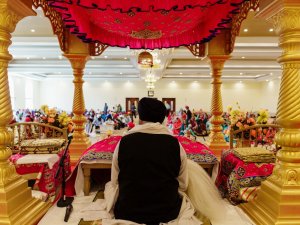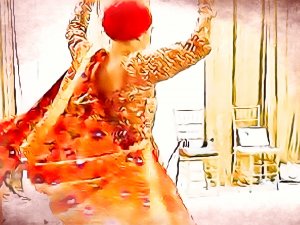 |
| I’m a Sikh with Depression |
|
June 16, 2015: I write this with the hope that it will help others who are struggling with depression. “Do you know how Punjabis cure depression?” Holding up a shoe, “You beat it out of them!” *Laughter* I grew up in an environment where depression was chalked up to Western fabrication, a result of self-centered neurosis that Americans had artificially created as an excuse for prescribed “uppers” (ie: anti-depressants). The above “joke” was one I heard a few times in my family. I remember my mother once saying, “Depression and the ‘woe is me’ attitude happens when you don’t have real problems, like starvation or homeless. So, you end up manufacturing problems just to feel sorry for yourself. You don’t see Punjabis with depression because they are focused on work and putting food on the table.” Due to this family environment, in about 8th grade I thought that my despondent demeanor was my own fault. “You need to fix your bad attitude,” my mother said. “Are you happy?” My dad asked me quite regularly. I could never answer “yes” with complete honesty and conviction. I was told that with enough will power and discipline, I could will myself to be happy. Once, at a bookstore my dad said, “If you’re not happy, go look at the self help section.” But, I couldn’t tell if he was being sarcastic or giving me genuine advice. I glanced over at the section and quickly dismissed the idea thinking, “That’s for losers and crazy people.” “Why should I look there?” I thought. “I have nothing to be unhappy about. My parents are loving and supportive. My siblings are fun. I am doing excellent in school and have great grades. I am a nice person.” But, like every person’s life, there were negative aspects to mine too. For instance, I was never fully accepted by my classmates and at times, was bullied. The opposing pull of American and Punjabi values, the friction between Sikhi and WASP (White Anglo-Saxon Protestant) culture, and the conflict between what my parents expected and what society wanted and what I wanted all mixed up in my mind and left me in a suspended state of anxiety. I would write journal entries trying to convince myself that the strict path my parents had me on was the right path for me. Being eager to please my parents and be a “good” Sikh, I followed their wishes for me and it resulted, in my opinion, a 50% “success”. The “success” included: being at the top of my high school class, being first clarinet in band, bound for one the best colleges in the nation, knowing a lot of kirtan and Sikh history, and having a strong and close relationship with my parents and siblings. The “failure” included: having no close friends, feelings of loneliness, thinking I was a loser, believing I was a social failure, and being constantly sad. “Everything about me is wrong,” I thought. “My hair, my clothes, my body, my personality, and the way I interact with people are all lame. No wonder I have no friends.” I had a mindset of fatalism, “Nothing I do matters. In the big picture, what’s the point?” I also felt like my time with my family was running out, “I have to make the most of the time I have with my family! I’m going to college soon and then I’ll be married and it will never be the same again!” I don’t blame my parents for my dark mindset. They did the best they could and cared for me from a place of love. They were trying to steep me in Sikhi while trying to allow me to be American at the same time. “It was a tricky balancing act,” my dad recalled. “I don’t know if we did it right.” During middle school and high school, my parents and I chalked up these sad, gloomy feelings of mine to “teenage angst” or a “bad attitude phase” that I would eventually grow out of. But, I never did, and it wasn’t a “just a phase.” 6 years after high school, I was clinically diagnosed with severe depression and anxiety. Over those six years, my sadness and despair had escalated to the point where I could not get through the day without crying. I remember walking to my room and collapsing on the stairs in uncontrollable sobs, for no reason. It felt like I could never stop crying. A poem I read by a girl named Hayley sums up how I felt: “The thick, black cloud overcomes her,
My depression peaked during my wedding planning when I was caught in the middle of the diverse expectations of my family and my fiancé’s family and, between what I wanted and what my fiancé wanted. I felt like I wasn’t good enough. I felt like regardless of what I did, someone would be mad at me and my life would be ruined. One day, my dad and I went for a walk and an airplane flew overhead. “Anytime I hear that, it triggers in me a feeling of hopelessness and despair,” I told him. It was at that point that my dad took me seriously. “Maybe you have a little bit of dysthymia (a mild, chronic form of depression). You should get that checked out,” he suggested. Growing up, I didn’t realize that though my parents joked about depression, they actually believed that some people really do have depression and it should be seriously addressed. If I had known their true beliefs regarding mental health earlier and they hadn’t stigmatized it, perhaps I would have sought help sooner. Initially, I refused to seek psychological help. I felt like I would be “giving up,” and admitting defeat. I thought that I could beat it myself and asking for help was a weakness. I thought people would think I was “crazy.” Reluctantly, with my parents love, support and encouragement, at 24 years old, I went to a psychologist and was officially diagnosed. Before that point, I did not know I was suffering from depression and anxiety. I felt utterly helpless. My therapist used cognitive behavioral therapy, a technique that examines the relationships between thoughts, feelings, and behaviors. Through therapy I learned many things that helped me heal.
I have also been leaning on Sikhi to help me fight depression. Seva: Community service and volunteering has helped me fight depression because it got me to interact with people and increased my social contact. It got me out of my own head and to focus on helping others so, I felt my actions were valued. When engaged in seva, I feel closer to the Sikh path and I feel like I am doing something good and needed. Simran: Meditating was something that my therapist and dad suggested I incorporate into my day. It helps me stay in the present moment and I to try and let go of the past and regrets and not focus on anxieties of the future. Gurbani Vichar: As I started reading more gurbani, I felt like the Guru was writing to me and to my condition. I read some shabads that said I should raise myself esteem to understand that I can merge with divine and that through seva and simran, I can attain peace and value. Other shabads describe pain and longing that I feel when depressed; a condition that can be alleviated by following Guru Sahib’s teachings and doing seva. Reading gurbani comforts me because it captures my experience and it provides me with answers. The biggest help in my life has been my husband. He has been a kind, patient, and understanding teammate. He hugs me when I cry, tries to rationalize my irrational thoughts, and he doesn’t get angry or frustrated with me. I feel so indebted to him for his unconditional love and support. This is the first time I have written publicly about my depression and anxiety. I have been hesitant to talk about it and share it with my friends and family because I am afraid they will stop spending time with me. I don’t want people to think, “She’s crazy! Let’s not be friends with her,” or “She’s smiling and happy today, is she faking it? Is it her medication?” I also don’t want them to think my skills or competency is compromised by my illness. But, at the same time I realize that we cannot break the silence and stigma around mental health without bringing attention to it, talking about it, and personalizing it. So, this is my attempt to help others. Slowly, as I open up to my parents, close friends, and family about what I am feeling, I have started to feel more free and liberated. It feels good to be myself and share my challenges and triumphs with those who care about me. I am not 100% healed yet, but I am getting there and unlike in the past (where I felt hopeless) I truly hope and believe that I will be happier than I have ever been as this journey continues. |


 Nothing brought me joy anymore. I blamed myself for not finding joy in my hobbies and I started to “should” myself: “I should be happy! I should like practicing clarinet! I should smile more!” But this type of thinking made me feel guilty and exacerbated my depression.
Nothing brought me joy anymore. I blamed myself for not finding joy in my hobbies and I started to “should” myself: “I should be happy! I should like practicing clarinet! I should smile more!” But this type of thinking made me feel guilty and exacerbated my depression.


